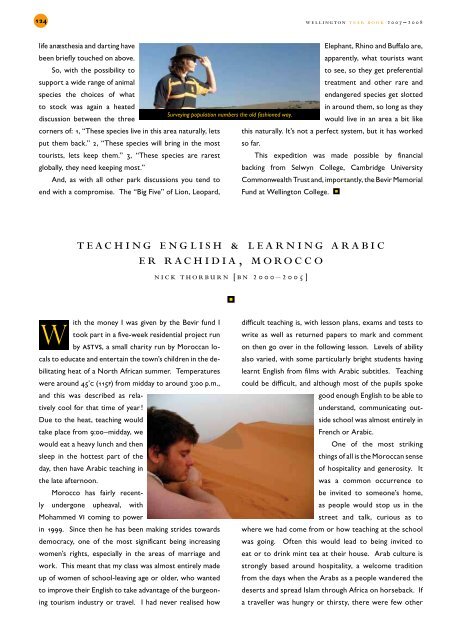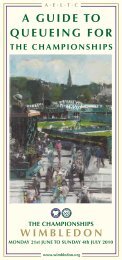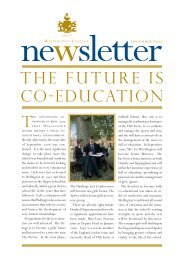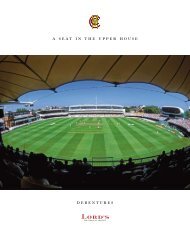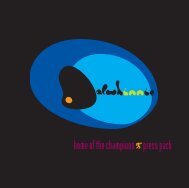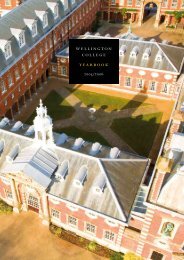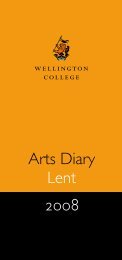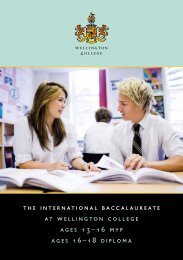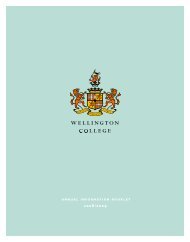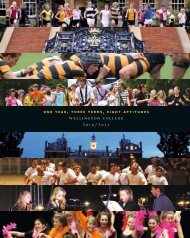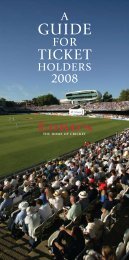golf - Jules Akel
golf - Jules Akel
golf - Jules Akel
- No tags were found...
You also want an ePaper? Increase the reach of your titles
YUMPU automatically turns print PDFs into web optimized ePapers that Google loves.
124 w e l l i ng ton y e a r b oo k 2 0 07 − 2 0 0 8w e l l i ng ton y e a r b oo k 2 0 07 − 2 0 0 8 125life anæsthesia and darting havebeen briefly touched on above.So, with the possibility tosupport a wide range of animalspecies the choices of whatto stock was again a heateddiscussion between the threeSurveying population numbers the old fashioned way.Elephant, Rhino and Buffalo are,apparently, what tourists wantto see, so they get preferentialtreatment and other rare andendangered species get slottedin around them, so long as theywould live in an area a bit likecorners of: 1, “These species live in this area naturally, letsput them back.” 2, “These species will bring in the mosttourists, lets keep them.” 3, “These species are rarestglobally, they need keeping most.”And, as with all other park discussions you tend toend with a compromise. The “Big Five” of Lion, Leopard,this naturally. It’s not a perfect system, but it has workedso far.This expedition was made possible by financialbacking from Selwyn College, Cambridge UniversityCommonwealth Trust and, importantly, the Bevir MemorialFund at Wellington College.options in the desert than to find someone who couldhelp. One of the Arabs who ran the camp, Ali, usedto regularly tell terrible jokes about bakheel, or misers.Being a cheapskate is frowned upon in Arab society, andfamilies will go out of their way to be hospitable evenwhen they can hardly afford it.I would recommend teaching as an easy way to travelt u rt l e c on s e rvat i onm a l ay s i av e r i t y l e e s on [o 2005–2007 ]and give something back to a culture or country you wantto experience. Learning a language at the same time is notalways easy, especially when you need to speak a third forday-to-day life, but the effort is worth it and despite somehysterical media and the odd notable exception Arab NorthAfrica is an intriguing, safe and, despite its proximity toEurope, very different place in which to travel and live.t e ac h i ng e ng l i s h & l e a r n i ng a r a b i ce r r ac h i d i a , moroc c on i c k t hor bu r n [bn 2000–2005]ith the money I was given by the Bevir fund IWtook part in a five-week residential project runby astvs, a small charity run by Moroccan localsto educate and entertain the town’s children in the debilitatingheat of a North African summer. Temperatureswere around 45˚c (115f) from midday to around 3:00 p.m.,and this was described as relativelycool for that time of year !Due to the heat, teaching wouldtake place from 9:00–midday, wewould eat a heavy lunch and thensleep in the hottest part of theday, then have Arabic teaching inthe late afternoon.Morocco has fairly recentlyundergone upheaval, withMohammed vi coming to powerin 1999. Since then he has been making strides towardsdemocracy, one of the most significant being increasingwomen’s rights, especially in the areas of marriage andwork. This meant that my class was almost entirely madeup of women of school-leaving age or older, who wantedto improve their English to take advantage of the burgeoningtourism industry or travel. I had never realised howdifficult teaching is, with lesson plans, exams and tests towrite as well as returned papers to mark and commenton then go over in the following lesson. Levels of abilityalso varied, with some particularly bright students havinglearnt English from films with Arabic subtitles. Teachingcould be difficult, and although most of the pupils spokegood enough English to be able tounderstand, communicating outsideschool was almost entirely inFrench or Arabic.One of the most strikingthings of all is the Moroccan senseof hospitality and generosity. Itwas a common occurrence tobe invited to someone’s home,as people would stop us in thestreet and talk, curious as towhere we had come from or how teaching at the schoolwas going. Often this would lead to being invited toeat or to drink mint tea at their house. Arab culture isstrongly based around hospitality, a welcome traditionfrom the days when the Arabs as a people wandered thedeserts and spread Islam through Africa on horseback. Ifa traveller was hungry or thirsty, there were few othern 5th June 10 volunteers stepped off the boatOonto the bay of Bubbles Dive Resort on PulauBesar, the largest of the Perhentian islands offthe north east coast of Malaysia. Through the companywox we were to stay at Bubbles Resort for one monthto learn about turtle conservation. We were a group of 3boys and 7 girls, ages ranging from 19–26, all of whom weretravelling around Asia either before or after the project.As part of a turtle conservation project, the main aimof our month at Bubbles was to learn about the human andenvironmental threats facing turtles, the threats facing theirhabitats, and methods in which these could be preventedor minimised. The first week entailed us obtaining ourOpen Water padi certificates, enabling us to explore andfurther learn about the coral reef that sustains 85% ofmarine life, as well as the different species that live there.Scuba diving in Malaysia’s coral reefs was incredible,diving with and identifying hundreds of different species offish, including bumphead parrotfish, pufferfish, titan triggerfish, as well as turtles, sharks, crown of thorns starfish,nudibranchs and moray eels. Completing my AdvancedOpen Water padi enabled me to take a night dive, as wellas a wreck dive at the Barge, a large boat wreck whose coordinatesare known only to two dive resorts, and a deepdive, diving to 30 metres.Every afternoon we took bin bags up and down thebeach collecting litter both from the guests at the resort,and also washed up from the sea. We also cut back treeroots and moved big pipes and rocks to make it easier forthe turtles to lay their nests.After dinner of pak choi, rice and chicken, we hadturtle watch which was conducted in three shifts; 9:00p.m. till midnight, midnight till 3:00 a.m. and 5:00 a.m. to8:00 a.m. This consisted of sitting in the restaurant playingcards and drinking tea, taking hourly walks up and downthe beach to see if any turtles were nesting with a torchwith a red filter so as not to disturb the turtles. If wecame across a turtle, we had to sit and watch over it tomake sure it wasn’t disrupted, the process normally takingabout two hours, but sometimes up to five or six. Wewould then record data including the length and width ofthe turtle, given by its track marks, whereabouts on thebeach and how far up it lay its nest etc.Our second and third weeks were dedicated toresearching and staging presentations concerning turtleand coral conservation to the guests of the resort, basicMalay and Chinese language courses, and fish id scuba dives.Our fourth and final week at Bubbles handed us thetask of creating a game, either a card game, a board gameor an outdoors game, which could be mass-produced andtaken to schools around Malaysia to teach children aboutturtle conservation and ways in which to minimize humandamage and maximise awareness and support. By the endof summer, Bubbles will have 6 different games to selectfrom. We took this final assignment incredibly seriouslyand genuinely felt the need to make a change by increasingunderstanding. In fact it really motivated a lot of us, andI’ve certainly come to re-evaluate my own career path.All in all it has been an incredible month, and I’velearned so much more about the environment and theimpact of mankind, and I’ve also been hugely inspired bywhat I’ve learned.


